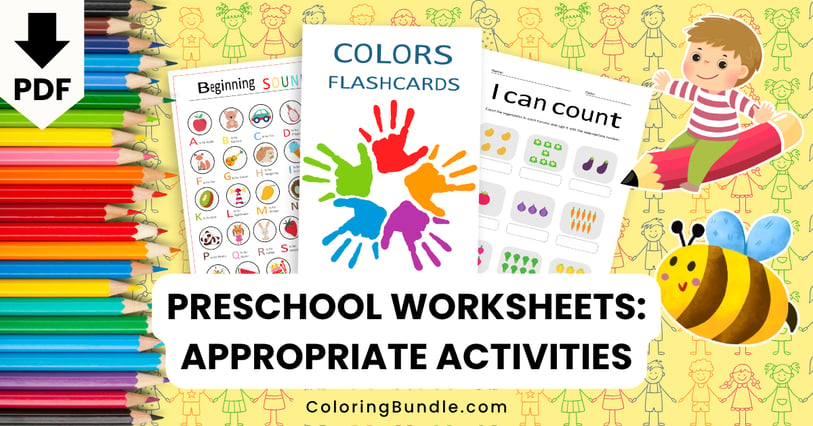The Ultimate Guide to Preschool Worksheets: Boosting Early Learning Through Purposeful Activities


When it comes to early childhood education, finding the right balance between play and structured learning can be challenging. As both educators and parents have discovered, preschool worksheets offer that perfect middle ground – providing focused learning opportunities while keeping young minds engaged and excited. But not all worksheets are created equal, and knowing how to select and use them effectively makes all the difference in your child's developmental journey.
Why Preschool Worksheets Matter in Early Education
Preschool represents a critical window in a child's development. During these formative years (typically ages 3-5), children are rapidly developing cognitive, social, and motor skills that will serve as the foundation for all future learning. According to the National Association for the Education of Young Children, well-designed early learning activities can significantly impact a child's educational trajectory.
Thoughtfully created worksheets support this development by:
Introducing fundamental concepts in an accessible way
Building fine motor skills necessary for writing
Reinforcing learning through repetition and practice
Creating opportunities for guided instruction
Preparing children for the more structured environment of kindergarten
Research from Harvard University's Center on the Developing Child shows that early learning experiences literally shape the architecture of the developing brain, creating either a sturdy or fragile foundation for all future learning and behavior.
Essential Types of Preschool Worksheets for Complete Development
Alphabet and Letter Recognition Worksheets
Letter recognition forms the cornerstone of literacy development. Effective alphabet worksheets should:
Introduce letters in both uppercase and lowercase forms
Connect letters to familiar objects (A is for apple)
Include tracing activities to develop writing skills
Offer varied activities like matching, coloring, and identification
These foundational activities help children recognize that letters are distinct symbols with unique sounds – the first step toward reading readiness.
Number and Early Math Worksheets
Early numeracy skills develop alongside literacy. Quality math worksheets for preschoolers focus on:
Number recognition (typically 1-10, then expanding)
Counting objects and connecting quantities to numerals
Basic patterns and sequences
Shape recognition and classification
Simple comparison concepts (bigger/smaller, more/less)
According to Stanford University's early math research, children who develop strong early math skills tend to perform better across all subjects later in their academic careers.
Fine Motor Development Worksheets
Before children can write letters and numbers with precision, they need to develop the small muscles in their hands and fingers. Worksheets that support this development include:
Tracing lines and shapes
Cutting practice along designated lines
Dot-to-dot activities
Mazes of varying complexity
Coloring within boundaries
These activities build the hand strength and coordination necessary for writing and other precision tasks.
Social-Emotional Learning Worksheets
Modern early childhood education recognizes that emotional intelligence is just as important as academic skills. Worksheets in this category might include:
Emotion identification activities
Scenarios that promote problem-solving
Activities that build self-awareness
Exercises that encourage empathy and perspective-taking
The Collaborative for Academic, Social, and Emotional Learning (CASEL) emphasizes that these skills form the foundation for positive relationships and academic success.
How to Choose the Right Preschool Worksheets
With thousands of options available, selecting appropriate worksheets can feel overwhelming. Consider these factors when making your selections:
Developmental appropriateness: Choose worksheets that match your child's current abilities while offering a gentle challenge.
Engagement factor: Look for colorful, visually appealing designs that will capture and maintain your child's interest.
Clear instructions: Instructions should be simple and straightforward, with minimal text.
Purposeful learning: Each worksheet should have a clear learning objective rather than just keeping children busy.
Progression of skills: Select worksheets that build upon each other, gradually increasing in difficulty as skills develop.
Integrating Worksheets into a Balanced Learning Approach
While worksheets offer valuable learning opportunities, they should complement – not replace – other forms of learning. Early childhood experts from Zero to Three recommend balancing worksheet activities with:
Open-ended play
Hands-on exploration
Movement and physical activity
Social interaction with peers and adults
Reading aloud and storytelling
The most effective approach uses worksheets as one tool within a diverse learning environment, rather than the primary method of instruction.
Best Practices for Using Preschool Worksheets
To maximize the benefits of preschool worksheets:
Keep sessions short: Limit worksheet time to 10-15 minutes for younger preschoolers, gradually increasing as attention spans develop.
Provide guidance: Sit with your child initially to explain concepts and offer support.
Celebrate effort: Focus on the process rather than perfection, praising persistence and improvement.
Follow interests: Choose themes that align with your child's current fascinations.
Create routines: Incorporate worksheets into regular learning times to build consistency.
Connect to real life: Reinforce worksheet concepts through everyday experiences and conversations.
Creating a Complete Preschool Learning System
While individual worksheets provide targeted practice, the most effective approach is a comprehensive system that addresses all developmental domains. A complete preschool curriculum typically includes:
Sequential literacy development (from letter recognition to early reading)
Progressive math concepts (counting to basic operations)
Science exploration activities
Creative expression opportunities
Social studies and cultural awareness
Physical development and health education
By thoughtfully selecting worksheets across these domains, you can create a well-rounded educational experience that prepares children for kindergarten and beyond.
Conclusion: The Lasting Impact of Quality Early Learning
The preschool years represent a unique window of opportunity in a child's development. By providing thoughtfully designed learning experiences – including appropriate worksheets – we set children on a path toward academic success, curiosity, and lifelong learning.
Remember that each child develops at their own pace, and the goal of early education isn't to accelerate this natural timeline but to support and enrich it. When used mindfully as part of a balanced approach to early learning, preschool worksheets become powerful tools for building the skills, confidence, and love of learning that will serve children throughout their educational journey.
Subscribe to our newsletter
Enjoy exclusive special deals available only to our subscribers.
